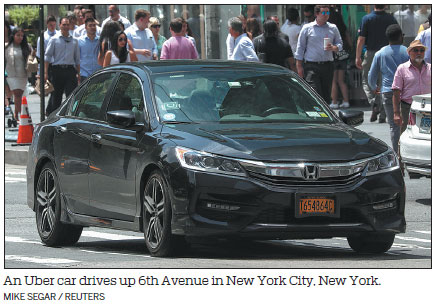Cashing out in Uber's IPO: China, Russia and the Middle East
SAN FRANCISCO - In 2015, Uber Technologies Inc went on a fundraising spree in China, tapping venture capitalists and State-backed corporations for cash and connections in an effort to navigate the Chinese regulatory environment.
Uber ultimately pulled out of China, but the investors it gained in the country became part of a gallery of far-flung Uber financiers that include US geopolitical rivals under intense regulatory scrutiny by the US government.
Uber's investors come in all stripes: state-owned banks and corporations from China and Russia; sovereign wealth funds from Qatar, Singapore and Saudi Arabia; a Russian businessman arrested last year on embezzlement charges; venture capital funds from across Europe and the United Arab Emirates; Indian conglomerates and a Malaysian public pension fund.
Many of these investors will likely have made a bundle last week in Uber's long-awaited initial public offering. The company priced its shares at $45 a piece, raising $8.1 billion in the largest US IPO since 2014, and began trading on the New York Stock Exchange on Friday.
The ride-hailing company's aggressive pursuit of capital and international presence from early on gave executives greater access to foreign investors compared to other US startups. Uber was also seeking cash at a time of frenzied growth, with global investment into US startups jumping 50 percent from 2013 to 2014, according to PitchBook Inc data.
That helped it raise nearly $14 billion in venture capital, making it the fourth best-funded startup globally. Uber has also raised more than $6 billion in debt, according to Pitch-Book.
Uber, more than almost any other Silicon Valley company, symbolizes the glut of foreign money that has helped fuel a tech investing frenzy.
But replicating its feat today would be an improbable task in the current regulatory climate, analysts and legal experts say.
In August, US President Donald Trump signed a law to expand the powers of a government group known as the Committee on Foreign Investment in the United States (CFIUS), which is tasked with reviewing foreign investments for potential national security and competitive risks.
It gives the CFIUS a mandate to probe transactions previously excluded from its purview, including attempts by foreigners to purchase minority stakes in US startups. It must approve deals between US companies employing sensitive technology and foreign investors with influence over the startup, such as a board seat.
The CFIUS has so far approved only about 10 percent of the deals submitted under the new law, according to attorneys' estimates. "What happened (with Uber) in 2015, you certainly could not do that again," said an attorney who advises clients on CFIUS cases and who spoke on condition of anonymity because of the sensitivity of the matter.
A spokesman for Uber declined to comment. Previously, Uber's former Chief Executive Travis Kalanick spoke publicly about the need to raise large sums quickly to buy market share and find local investors who would help smooth the regulatory path in different countries.
The lion's share of Uber's fundraising was completed prior to the new CFIUS law, and there is no indication any of these investments were in any way unlawful. Chinese State-backed funds have invested in dozens of Silicon Valley companies, from drones to self-driving cars and cybersecurity.
But the challenge of a tech company replicating Uber's fundraising today highlights just how much US regulators have cracked down on foreign investment.
Reuters

(China Daily 05/13/2019 page19)














